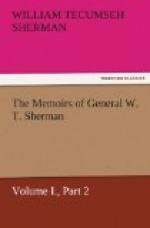In due season, about July 15th, our division moved forward leaving our camps standing; Keyes’s brigade in the lead, then Schenck’s, then mine, and Richardson’s last. We marched via Vienna, Germantown, and Centreville, where all the army, composed of five divisions, seemed to converge. The march demonstrated little save the general laxity of discipline; for with all my personal efforts I could not prevent the men from straggling for water, blackberries, or any thing on the way they fancied.
At Centreville, on the 18th, Richardson’s brigade was sent by General Tyler to reconnoitre Blackburn’s Ford across Bull Run, and he found it strongly guarded. From our camp, at Centreville, we heard the cannonading, and then a sharp musketry-fire. I received orders from General Tyler to send forward Ayres’s battery, and very soon after another order came for me to advance with my whole brigade. We marched the three miles at the double-quick, arrived in time to relieve Richardson’s brigade, which was just drawing back from the ford, worsted, and stood for half an hour or so under a fire of artillery, which killed four or five of my men. General Tyler was there in person, giving directions, and soon after he ordered us all back to our camp in Centreville. This reconnoissance had developed a strong force, and had been made without the orders of General McDowell; however, it satisfied us that the enemy was in force on the other side of Bull Run, and had no intention to leave without a serious battle. We lay in camp at Centreville all of the 19th and 20th, and during that night began the movement which resulted in the battle of Bull Run, on July 21st. Of this so much has been written that more would be superfluous; and the reports of the opposing commanders, McDowell




